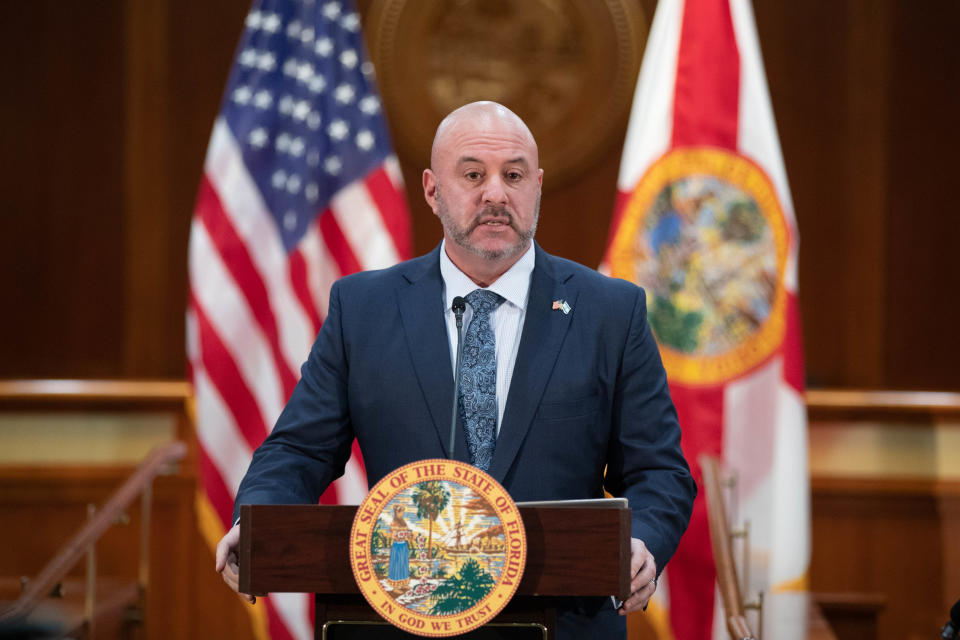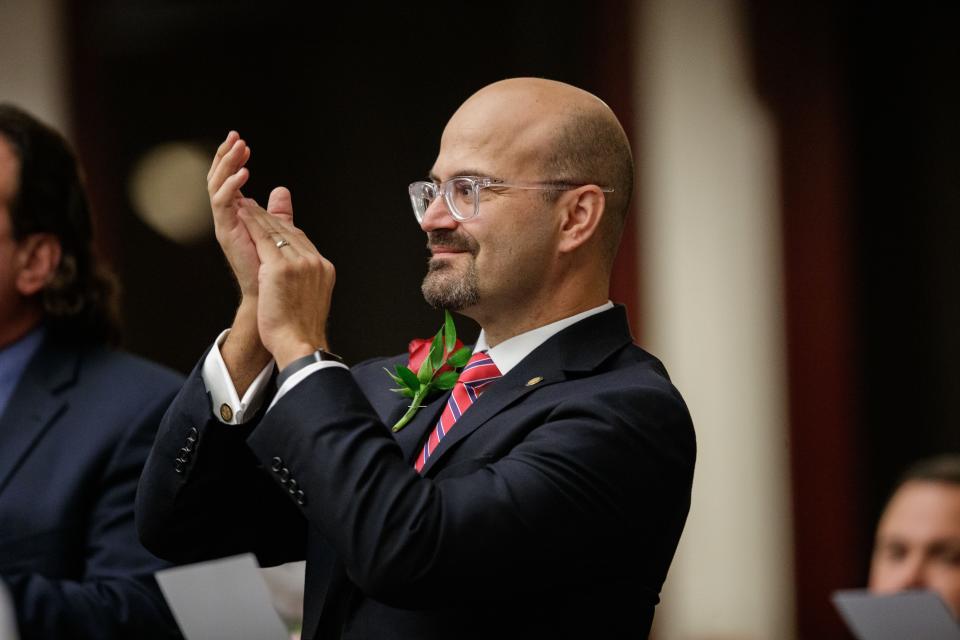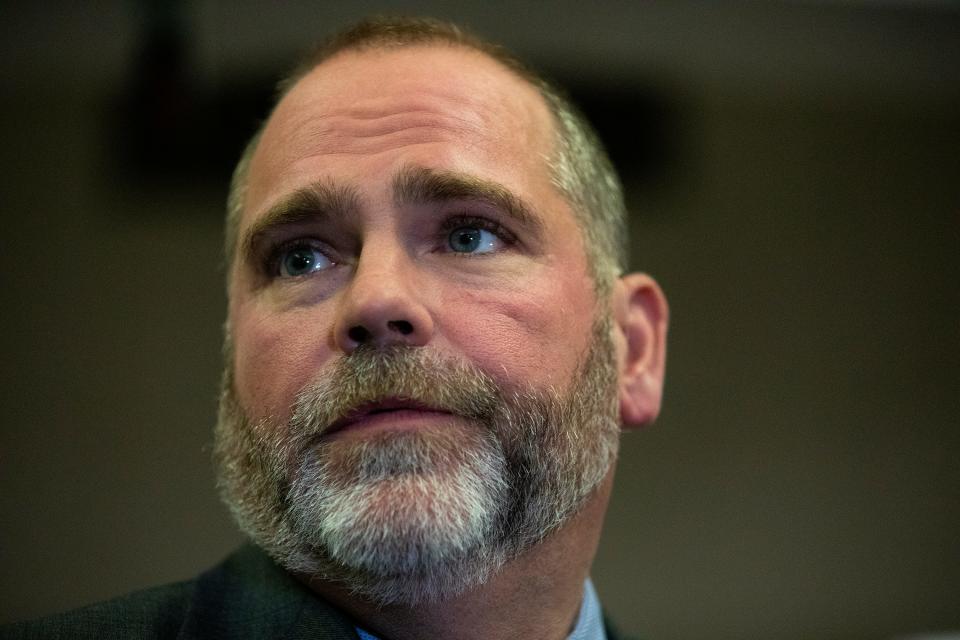Closing cold cases: Lawmakers want Florida to collect DNA from every state inmate
- Oops!Something went wrong.Please try again later.
- Oops!Something went wrong.Please try again later.
Serial killer Samuel Little reopened years-long mysteries when he confessed to more than 90 killings during his stay in a Texas prison a few years ago.
Investigators from all over the country, including Florida, paid the murderer a visit in hopes any of their cold cases could be traced back to him. And slowly but surely, one confession solved numerous cases.
But if two Florida lawmakers get their bills passed, investigators may not have to go to these extreme lengths to put a bookend on an unsolved crime.
Rep. Tom Fabricio, R-Miami Lakes, and Sen. Blaise Ingoglia, R-Spring Hill, filed identical bills (HB 533, SB 524) that would require all Florida inmates in the state prison system to submit DNA samples by Sept. 30, 2024, if they don't already have one on file.
Currently, whenever a person is coming in or out of the system, a swab of the inside of the cheek is taken.
As of last November, almost 1.7 million "qualifying offenders" have DNA profiles stored in the Florida Department of Law Enforcement's active database. The profiles are searched every day by detectives looking for matches to samples from crime scenes, FDLE spokesperson Dana Kelly said.
According to a staff analysis of the bill, adding more offenders to the database wouldn't cost the FDLE anything but could cost the Florida Department of Corrections an undetermined amount.

"FDLE regularly works with agencies statewide to review, investigate, and conduct forensic analysis on the local agencies’ cold cases, but we are not the lead investigating agency," Kelly said.
The database has been active for 34 years, receiving more than 76,000 hits, which is when a known DNA profile matches a DNA profile from an unsolved crime and "provides an investigative lead," she said.
Once the DNA database was established, samples were also taken from the inmates who have been sitting in Florida prisons long before technology allowed for the testing and storing of DNA. According to the bill's staff analysis, the FDC confirmed that as of Nov. 20, 2023, 48 Florida inmates still needed to have samples changed.
"The number of inmates changes constantly due to new inmates coming into the system while others are released," the analysis says.
Even though the database is comprehensive and contains millions of profiles, a cold case investigator from Hillsborough County felt the gap in the data collection was significant enough to affect his work. He approached Fabricio when the lawmaker was working in the Florida State Guard and brought the concern to his attention.
Fabricio said he and Ingoglia are very excited about the potential law and the closure it might bring to Florida families.

"You don't know how many cold cases we may be able to close," Fabricio said. "Maybe some, maybe none, maybe one, but even if it's just one that would be really important."
DNA has become the next fingerprint, said State Attorney Jack Campbell, the elected prosecutor for the state's 2nd Judicial Circuit, based in the capital. State inmates are an obvious population that could be very helpful when solving cases, Campbell said, and collecting and checking DNA is a relatively easy thing to do.
"I think it's a great idea," Campbell said of the bill.
The DNA samples that are already on file are all uploaded to the U.S. Department of Justice's Combined DNA Index System, which allows investigators across the country to search for DNA matches in every state. Getting the missing DNA profiles from inmates could not only help Florida close cases, but other states too.

Even if a DNA match doesn't solve the case, it could provide important investigative leads, he said. Criminals often commit multiple crimes before they ever get caught, and matching their DNA could pin them to a string of events before their arrest.
Access to every inmate's DNA would also help prosecutors lock up the right people — and could even provide them with the means to exonerate the wrongfully imprisoned.
During the investigations that opened up after Little's confession, Campbell said they freed several people who were serving time for Little's crimes after the murderer told detectives he was at fault and they locked up the wrong person.
He admitted to killing a dozen people in Florida in the 1970s and 1980s, spanning eight communities – Fort Myers, Plant City, Tampa, Homestead, Kendall, Miami, Gainesville, Ocala and Perry.
Had Fabricio and Ingoglia's bills been a law back then, they wouldn't have had to wait all those years for a confession, and the whole process would've been faster and easier, Campbell noted.
"The more closure that we can give a victim's family and answer the why, the better . . . because they are forever, for the rest of their lives, searching for answers," he said.
Elena Barrera can be reached at ebarrera@tallahassee.com. Follow her on X @elenabarreraaa.
This article originally appeared on Tallahassee Democrat: Florida lawmakers call for comprehensive collection of inmate DNA

